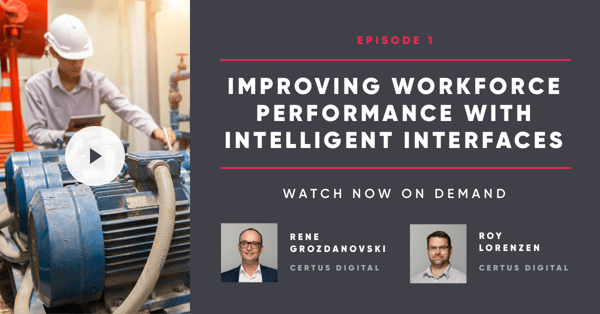A few weeks ago, we kicked off #DigitalDialogues, our new series of virtual meetups for leaders form asset intensive organisations. For this first episode, I was joined by my colleague Roy Lorenzen and Richard Jackson from Massey University to discuss how intelligent interfaces can help improve workforce performance.
It was an excellent opportunity to quiz Richard on how Massey University is approaching intelligent interfaces and how they are dealing with the challenges that come up. Richard shared several valuable insights. Here are the top four that stood out to me.
1. Making data accessible is the big challenge
Richard outlined that they have a lot of data, including some that is being collected from machines and sensors. The challenge for them is pulling all this data from different sources together to make it accessible to workers in the field in real-time. I’ve got a feeling this is a challenge many can relate to.
2. Challenge the need for 100% internet coverage
Like so many organisations, Richard and his team assumed they would need 100% connectivity for intelligent interfaces to work efficiently. However, he shared that once they started to challenge that assumption a bit, they realised there are actually many areas where data does not need to flow in real-time and, therefore, connectivity is not required.
This realisation made the overall project much more achievable and also meant Massey did not invest in creating connectivity were it wasn’t really needed.
3. Intelligent interfaces can help with the response to COVID-19
As almost all of us, Massey University has been significantly impacted by the Coronavirus pandemic. In response to this, Richard has been thinking about the role that interfaces and sensors could play in their response.
For example, the ability to track people’s movement to have an accurate record of where a worker was at any given time, and who they had contact with, would be extremely valuable in meeting contact-tracing requirements.
4. Processes before interfaces
When I asked Richard what advice he would give organisations who are just starting out on their intelligent interface journey, he made one crucial point; “Make sure you fully understand your processes.”
Richard pointed out that mobile solutions are often seen as a quick fix. However, the reality is that if the backend processes are not optimised, it will be hard for mobile solutions to deliver significant value.
These are just four or the valuable insights Richard shared. And of course, Roy Lorenzen also contributed much critical information. To hear our full conversation about intelligent interfaces, watch the first episode of #DigitalDialogues on-demand now.

Stay up-to-date with the latest news and receive notifications right to your inbox when new articles are published by subscribing now.